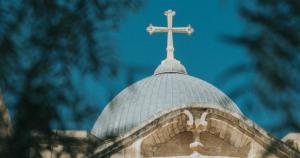 There is a lot of chatter today about the formative dimension of church worship. One can be forgiven for thinking that if we would just get our worship right we’d all be formed into model Christians. My observation is that if gathered worship is formative then the best liturgies should produce the best Christians, and then one could just wander into any one of the major liturgical churches and… well … it’s rather obvious to me that liturgy does not formation make. At least as many are making the claim.
There is a lot of chatter today about the formative dimension of church worship. One can be forgiven for thinking that if we would just get our worship right we’d all be formed into model Christians. My observation is that if gathered worship is formative then the best liturgies should produce the best Christians, and then one could just wander into any one of the major liturgical churches and… well … it’s rather obvious to me that liturgy does not formation make. At least as many are making the claim.
Yet, I agree: liturgy and worship are formational. But faith and genuine engagement are required for it to become formational, and when the worshipping community (and its individuals) are genuinely engaged, formation occurs at the deepest levels.
A good example of this is Barry Jones, Dwell: Life with God for the World. His chapter on worship — and here is thinking of the church gathered for worship without ignoring that private worship flows out of corporate worship — instructs on how worship can be formational.
Three words about church rise to the surface immediately:
For the early Christians, the fullness of their experience of church could be captured by three Greek words: leitourgia, koinonia and diakonia.
Leitourgia—the “work of the people”—referred to their gathering for public worship.
Koinonia is often translated by the word ‘fellowship,” but that is too thin a word for many of us (especially those with memories of bad potluck dinners in the fellowship hall). Koinonia is a rich word that refers to shared life lived in intimate community.
Diakonia is the calling of the entire community to participate in the mission of God in the world. … It is our collective vocation to give ourselves away in service for the glory of God and the good of other people. And no one is exempt. Every Christian is “called to ministry.” Our “breathing in” in worship comes both as response to and preparation for our “breathing out” in mission (141).
Here is the issue: many American Christians are convinced set patterns in worship are ruts we need to jump rather than rhythms we need to indwell. Everything then needs to be thought up anew by each generation and each church and each pastoral change so that today many think the major formative elements of worship and the major accomplishments of worship … well, these things are not thought about because we go to church to hear sermons. We sing and we think that’s worship. OK, these are all important but when they are divorced from the church’s wisdom about a properly ordered time of worship as a gathered church they do form us: into passive watchers and in-takers.
In a moment we will get to the major elements of the church at worship, but the point needs to be made in advance: when the fullness of the church’s wisdom becomes integral to worship and when that is combined with faith-engagement, the church can be formed. First, what worship accomplishes:
Barry contends worship is designed to accomplish four things:
First, worship redefines our identity.
Second, worship reorders our affections.
Third, worship repatterns our imagination.
Finally, worship reorients our life in the world.
How does this all happen? What is going on in the worship that leads to these four elements? What are we doing in worship? What are we to be doing when we gather for worship?
1. Confessing our sin.
2. Rehearsing our story. “When the gathered church sings songs, recites creeds and reads Scripture, we are rehearsing the story of God” (149).
3. Hearing God’s Word.
4. Sharing God’s table.
5. Being sent on God’s mission.
Notice these elements as the church’s longstanding wisdom on integral elements in worship. Confession draws us into why we gather: to worship the God who forgives us of our sins. Rehearsing the Story entails the public reading of Scripture — not simply a snippet of a text for the sermon itself but the Body gathered to hear God speak, regardless of the pastor’s sermon. Hearing God’s Word teaches us to listen to the sermon as a response to the reading of Scripture. The table draws us into confession and the grace of forgiveness so we can leave as those sent on God’s mission. Fellowship surrounds these five elements.










